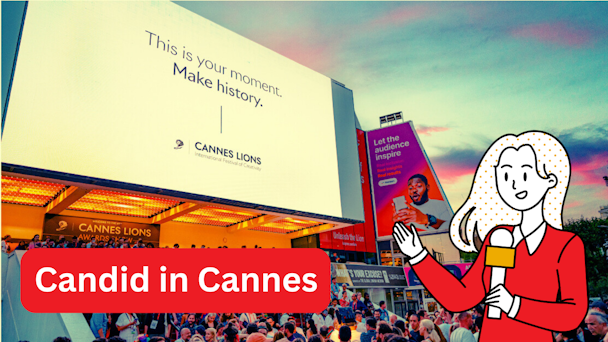Candid in Cannes: AI dominates conversations, but are marketers convinced?
The Drum’s team in the south of France quiz CMOs and agency leaders on the week’s hot topics.

The Drum questions the lucky souls out at Cannes Lions
It will come as no surprise that AI has quickly dominated the conversation at the Cannes Lions festival this year. Panels, keynotes, pitches and meetings couldn’t avoid the question of whether the technology will innovate or destroy the way marketers and creatives work.
Anticipating that it would be the word of the week, Publicis even ran an ad campaign to remind everyone of how they had mercilessly mocked its AI investment in 2017, quipping: ”Is it OK to talk about it now?”
But for every marketer who tells us they are all-in on AI, there is another exerting caution on its implementation.
Advertisement
So, when the hype dies down, the rosé stops flowing and marketers are back at their desks on Monday morning, will they have come away optimistic or pessimistic about the role AI will play in their business?
Mark Kirkham, international chief marketing officer, Pepsico: “The topic of conversation is obviously generative AI. And it’s an incredibly powerful tool but one, as an industry, we have to be smart about. There are risks associated with it. There’s bias. There are IP issues, especially images. And there’s the openness versus the closed use. So we need to think about the responsible framework. There’s a ton of education that needs to happen among marketers.”
Rob Doubal, co-president and chief creative officer, McCann London: “Personally, I think it’s really exciting. As a creative person, you’re normally just given what’s there already and you have to do something better. It’s the same role every time. It’s just an incredible new tool out there to think about or use or fend off.”
Joy Robins, global chief advertising officer, The New York Times: “We need to be incredibly intentional about how we enter this space. We as an industry and company are being incredibly thoughtful about how to leverage and make sure it supports us as a business and journalistic organization. It is really important to say that it is not replacing human journalism. It is not augmentation.”
Mark Singer, chief marketing officer, Deloitte Digital: “Generative AI has the potential to be the most disruptive thing that this industry will ever face. And I think it’s a good thing – a lot of us think it’s a good thing. It has been great watching some of our creatives figure it out. What came out is that generative AI is a great idea-generation tool. You can input words, you can input ideas, images – it makes connections to new things that help you, as a human, figure out there’s another angle on this. You get to stretch creative ideas in very new and interesting ways.”
Advertisement
Milka Privodanova, VP and head of EMEA, Pinterest: “We are already utilizing AI – so much of our contextual products and recommendations use AI. We use It to police some of our policies. We like to think that we have one of the biggest data sets on images and AI can only be as good as the images you train it on. It is not new.”
Steve Silvers, head of product, creative and media, Kantar: “I’m optimistic – AI has the potential to make marketers look like rockstars. There’s a lot of talk about generative AI putting the ad industry out of work, but the real benefit is to amplify human ideas and creativity – not replace creatives. At Kantar, we are optimistic about AI for scaling our capabilities and clear about the distinct roles of people and tech in our industry.”
Richard Edelman, chief executive, Edelman: “I was saying before to my team, I look at AI right now as a risk as much as I do an opportunity, because of disinformation. The quality of facts is already compromised by ideology. We have to put quality facts into the social discussion such that, whenever content comes up, it at least has a chance of being correctly depicted. And if it’s false, we better correct it quickly.”

